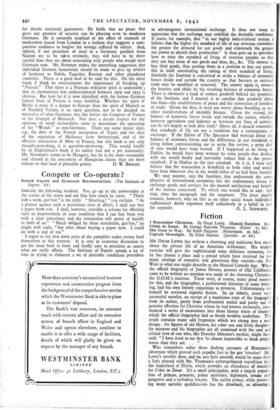Compete or Co-operate?
British Export and Economic Reconstruction. (The Institute ot Export. 6d.) IMAGINE the following incident. You go up to the newsvendor at the corner of the street and ask him how much he earns. "Thirty bob a week, guy'nor," is the reply. " Shocking! " you exclaim. "As a protest against such a monstrous state of affairs, I shall not buy a paper from you. I shall, however, consider a scheme for effecting such an improvement in your condition that I can buy from you with a clear conscience and the transaction will prove of benefit to both of us." "Much obliged by them sentiments, guv'nor," he might well reply, "but what about buying a paper now. I could do with a cup of tea."
I regret to say that some parts of the pamphlet under review lend themselves to this travesty. It is easy in economic discussion to get the issue back to front and fatally easy to postulate as causes what are really effects. The Institute of Export spends a lot of time in trying to elaborate a set of desirable conditions precedent
to advantageous international exchange. It does not 'seem to appreciate that the exchange may establish the desirable conditions. It states, for example, that "in our highly industrialised system it follows that the higher the standard of life of our overseas customers the greater the demand for our goods and conversely the greater our power to absorb their production." It then goes on to speculate how to raise the standard of living of overseas peoples so that they can buy more of our goods and thus, &c., &c. The answer is, buy their goods, thus putting them in a position to buy our goods, this in itself constituting the raising of their standard of living. Similarly the Institute is concerned to strike a balance of economic forces inside and outside the country so that barriers to external trade may be modified or removed. The answer again is, remove the barriers and abide by the resulting balance of economic forces. There is obviously a fund of earnest goodwill behind the proposals of the Institute, and I counsel it to canalise that goodwill along two lines—the establishment of peace and the restoration of freedom of trade. Given the first, it need not worry about hoarding or any other manifestations of unstable finance. Given the second, the balance of economic forces inside and outside the nation, whether between agriculture and industry cm between any lines of activity. can be left largely to look after itself. Above all, it shouki remember that standards of life are not a condition but a consequence of exchange. If the Editor of The Spectator had worried about the balance of economic forces and the differences in our standards of living before commissioning me to write this review, a great deal of time would have been wasted. If I happened to be living in Dublin, he would have been warned by some people that dealing with me would finally and inevitably reduce him to the potato standard: if in Madras to the rice standard. As it is, I trust and believe that the transaction is beneficial to both sides and would have been wherever else in thz. world either of us had been located.
We may assume, says the Institute, that underneath the com- plexities of international commerce lies the rudimentary desire to exchange goods and services for the mutual satisfaction and benefit of the nations concerned. To which one would like to add: full stop, close the paragraph and the argument. The great puzzle remains, however, why on this as on other social issues individual rudimentary desire expresses itself collectively in a belief in just


























 Previous page
Previous page